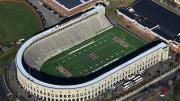A study of the Harvard Department of Athletics, released today, highlighted a “cultural and structural gap” between athletics and academics at Harvard.
Commissioned in the fall of 2019 by Claudine Gay, dean of the Faculty of Arts and Sciences (FAS), the review was compiled by the organizational research firm Mercer. Its June 5 announcement comes just more than a week after Brown University announced the elimination of 11 varsity sports, including men’s track and cross country. [Updated June 11, 2020, 7:00 a.m.: Brown announced it was rescinding the elimination of the men’s track, field, and cross-country teams because of the prospective loss of diversity and opportunities for black student-athletes.]
The Harvard study did not make any recommendations for reductions in Crimson athletic programs. Nor did it speak to recent adjustments to address of gender-based pay inequity among coaches, or to cultural problems highlighted by past incidents of sexist behavior by male student athletes. Mercer focused instead on evaluating strengths and weaknesses of the department, discovered through online surveys of students, faculty, staff, and administrators from the athletic department and across the University.
In the “Key Findings” section of the study, Mercer paired strengths and areas of improvement for the experiences of both students and coaches. “Athletics is a formative experience for student-athletes,” the report states. “It is also demanding and time-intensive.” Ninety-three percent of student-athletes favorably viewed the statements “I feel I am learning important life lessons at Harvard” and “My coaches care about me as a person.” But many student-athletes indicated that they felt unable to explore Harvard’s resources. “Based on the seven diagnostic items with elevated levels of disagreement,” the study states, “student-athletes are struggling with three fundamental issues: finding free time to relax, unwind, and take advantage of community experiences; getting the sleep they need to feel rested and the nutrition they need to maintain a healthy diet; and balancing their academic and athletic commitments.” Gay, in a statement accompanying the report, briefly mentioned possible sources of stress that were not elaborated on in the report: “[Student athletes] pointed to structural issues, like the current course schedule and House dining hall hours, that they experience as barriers to this integration.”
The report found that athletic department staff and coaches “are engaged and committed,” but also stated that they “feel disconnected from FAS and the college.” Only 22 percent of staff members agreed that there is a “high level of collaboration and partnership” between College faculty and staff and their athletic-department colleagues. Just one-third agreed that “professors do a good job helping students balance their athletic interests and their academic responsibilities.” One staff member noted in a survey that, “Sometimes things become so siloed that each area of the University and Department seems to work in [its] own world.”
The report was short on concrete recommendations—advocating for “strengthening bonds” among the College, FAS, and the athletic department and “renew[ing] Harvard’s vision of Athletics.” But it could lead to more discussion of student-athlete health, a topic that will likely receive attention from incoming athletic director Erin McDermott. One faculty member suggested the University “focus on improving the overall health and wellness of the entire student population as a whole,” not just that of one sector. Gay, in the statement, wrote that she believes the University can find “practical solutions to challenges.”
“I know that these conversations will not always be easy, especially at first,” she concluded. “But I also know that we have a strong foundation to build on in our shared commitment to the success of our student-athletes, to the health and well-being of our students more broadly, and to Harvard.”









